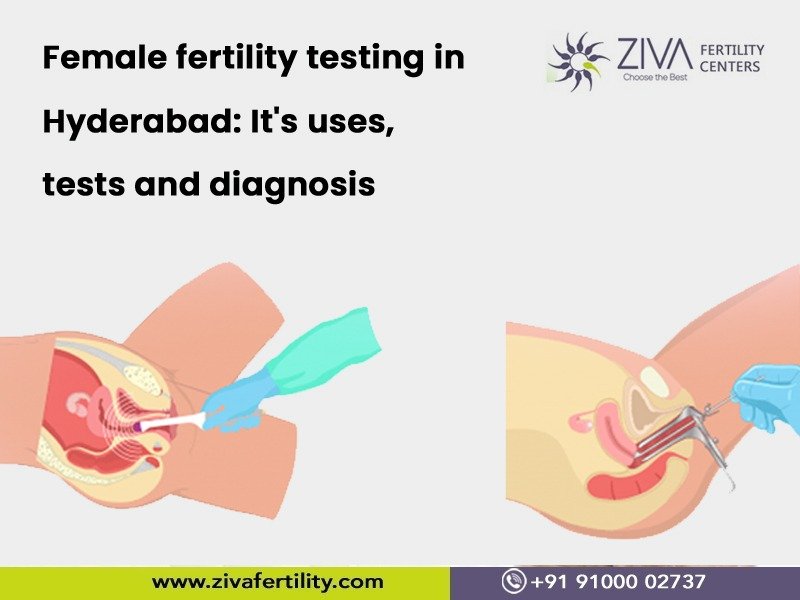Any couple looking forward to welcoming their bundle of joy will be anxiously waiting for their moment. So even after trying for six months to one year, if there are no promising results, they should consult a fertility specialist. The fertility journey has the potential to dramatically alter the life of the couple that they envisioned for themselves. Nowadays, one does not have to feel hopeless if they are not naturally pregnant within six months to one year. A study by the National Institute of Environmental Health Sciences found that the majority of women up to the age of 39 conceived in their second year of trying without any medical assistance.
Female fertility testing in Hyderabad and its uses
The most apparent use of female fertility testing in Hyderabad is when women are unable to get pregnant for a year (six months if over age 35). Female fertility testing in Hyderabad is also helpful in the following conditions:
- Irregular menstruation, or if the flow is heavy or too low. Women could not get their periods even after 35 days, or the periods were absent
- History of recurrent miscarriages
- History of pelvic pain or endometriosis
Female fertility testing in Hyderabad – tests and diagnosis
As soon as you visit a reputed fertility centre kike ZIVA fertility clinics, our specialists will ask you about your :
- Gynaecologic history
- Previous history of pregnancies and especially their outcomes.
- Menstrual health includes irregular and missed periods or any spotting between periods. Changes in blood flow or the presence of large blood clots
- Birth control used in the past
- If you are already under any fertility medication or have had any surgeries.
- If you started the fertility treatments in a different clinic, It is highly advisable to carry those medical records and other test reports or at least have them sent ahead.
Physical examination
Physical examination mainly involves checking the pelvic area and also looking for any symptoms of chlamydia, gonorrhoea, or other genital infections that may contribute to the fertility problem.
Blood Tests
After the initial consultation with our fertility experts, they will start with female hormones, prolactin, as well as for HIV and hepatitis, thyroid hormones.
The blood tests are scheduled around the menstrual cycle. The tests are conducted to check hormones such as follicle-stimulating hormone (FSH) and luteinizing hormone (LH). The tests are done on day two or three of your cycle.
In the middle of the menstrual cycle, the luteinizing hormone surges, so you may need to come in for more tests then
Some tests are also done during the ovulation to check your estradiol and progesterone levels and compare them with those taken on day two or three of your cycle.
BBT charting: Basal body temperature charting is a way of checking ovulation. So, if you still need to start BBT charting, now is the time to start.
Postcoitus test: After several hours of intercourse, the postcoitus test is done where a sample of cervical mucus is taken for microscopic examination. This test has a dual advantage as it tests both the viability of the sperm and their interaction with the cervical mucus.
Transvaginal (pelvic) ultrasound exam: The fertility specialist will do the ultrasound to check the uterus and the follicles of the ovaries. To conduct this exam, women are asked to visit the fertility clinic 15 days before their expected menstrual period.
Hysterosalpingogram: this test is also known as HSG or “subprogram.” The test starts by injecting a liquid dye into the uterus through your cervix and vagina. After the diet has successfully spread through the uterus, a series of X-rays of the fallopian tubes are taken. HSG aims to diagnose fallopian tube blockages and defects of the uterus. In the X-ray, single or dual tube blockages are apparent since the liquid dye won’t get past it. For this test, women should come between days six and 13 of their cycle.
Hysteroscopy: If the above test results show an abnormality, then our ZIVA fertility experts will suggest a hysteroscopy where a telescope-like instrument is inserted into the uterus. With the help of this instrument, the fertility specialist can see and photograph the area to look for problems.
Laparoscopy: A small incision is made into the abdomen to insert the laparoscope, mainly to look for endometriosis, scarring, and other conditions. Since this procedure is slightly invasive, women are put under general anaesthesia.
Endometrial biopsy: The uterine lining biopsy is done to see if everything is typical for an embryo to implant. With the help of a catheter that is inserted into the uterus, the fertility expert will remove the sample tissue from the endometrium. Since the procedure is a little bit uncomfortable and causes pain, women are given painkillers beforehand. Please note that the above list is a comprehensive collection of female fertility testing in Hyderabad. However, not all women undergo all the tests. We at ZIVA fertility clinics are sensitive to this issue and order only when needed.
We at ZIVA are pioneers in the field of IVF treatments. For more information, please visit our website https://zivafertility.com/ or at +91-9100002737 or +91-9347406900
















